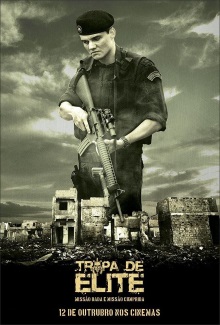
I got this as a recommendation from a number of different places and one of them was the videogame Max Payne 3. The game included a level that was set in the favelas of Rio de Janeiro and Rockstar cited this film as one of the references they used. The film itself was a massive success in its native Brazil, both commercially and critically, and its sequel is the single highest grossing film in the country. Not bad as the feature film debut for its director José Padilha.
It recounts how the BOPE, the elite military police of the city, operates. Their job isn’t to investigate crimes but to eliminate targeted gangsters and bail out the regular police when they get into trouble. Roberto Nascimento, captain of one of the squads, is being pressured into leaving his unit by his wife who is expecting their first child. He is determined to first find a worthy successor and it comes down to two choices: the idealistic André Matias who pursues law studies parallel to his career in the police and the aggressive Neto Gouveia. At the same time, the Pope is visiting the city and has decided to stay in the Archbishop’s home which is right next to the slums. The police are then pressured into conducting daily and dangerous raids into the favelas to clear out the drug-dealers.
Both of the officer candidates are clean and try to do their jobs as well as they can but are quickly disillusioned by how prevalent corruption is. Instead of catching criminals or solving crimes, they are given mundane tasks like compiling statistics and fixing the department’s vehicles. But as their superiors are more interested in collecting protection money and covering their own asses, even these tasks prove impossible without compromising their morals. Interestingly, this film portrays BOPE itself as being free of corruption but given that they straight out shoot first and ask questions later, not to mention routinely torture civilians for information, they’re still not exactly angels.
Shot with harsh lighting and high contrasts, this film doesn’t make for a pleasant viewing experience. The camera moves around like a junkie on acid, whipsawing from face to face and following the tight twists and turns of the slums. Combined with the need to read the subtitles for audiences who don’t speak Portuguese, it gives your eyes quite a workout. Still, all this energy does convey the proper sense of how scary the favelas are, especially to the police, and how shitty the situation feels. I think a great mark in Padilha’s favor as an action director is that it puts you in the shoes of the police officers in feeling confused and terrified in the middle of a running gunfight, yet as a member of the audience, you’re never lost about what the situation is.
Perhaps the best part of this film is that it convincingly chronicles the path of how an idealistic young officer can turn into the jackbooted thug of popular imagination. It even manages to do so without turning said officer into a villain in the eyes of the audience. Besieged by the general public who hates them and forced to achieve impossible goals by their political masters, the police naturally places their first priority on taking care of their own when things go bad. That’s a choice that we can relate to even if it’s still deplorable. At the same time, we’re properly horrified that this ends up with the police seeing the populace that they’re supposed to protect as the enemy.
It’s important to note that at its heart this is still a film that glorifies the BOPE and it wouldn’t be surprising if it inspired a generation of new recruits. Though it doesn’t shy away from depicting how brutal and indiscriminate their methods are, it seems to be saying that this level of brutality is exactly what is needed when faced with the extreme level of violence that is prevalent in the favelas. It also takes aim at the relatively well off middle and upper classes, accusing them of being the ones who buy the drugs and so keep the dealers in business. This may have an element of truth in it, but is far too facile an argument. In particular, it seems to suggest that university students who smoke marijuana contribute to the violence. That’s way too slippery a slope for me to feel comfortable standing on.
So, no, this isn’t a particularly sophisticated analysis of organized crime in Rio de Janeiro. But it is a remarkably visceral presentation of the street-level view of the situation. Its characters are realistic, their motivations are clear and believable and you even end up empathizing with people that you have every reason to dislike. Plus on top it all, it manages to be a perfectly cromulent action movie.
2 thoughts on “Tropa de Elite (2007)”